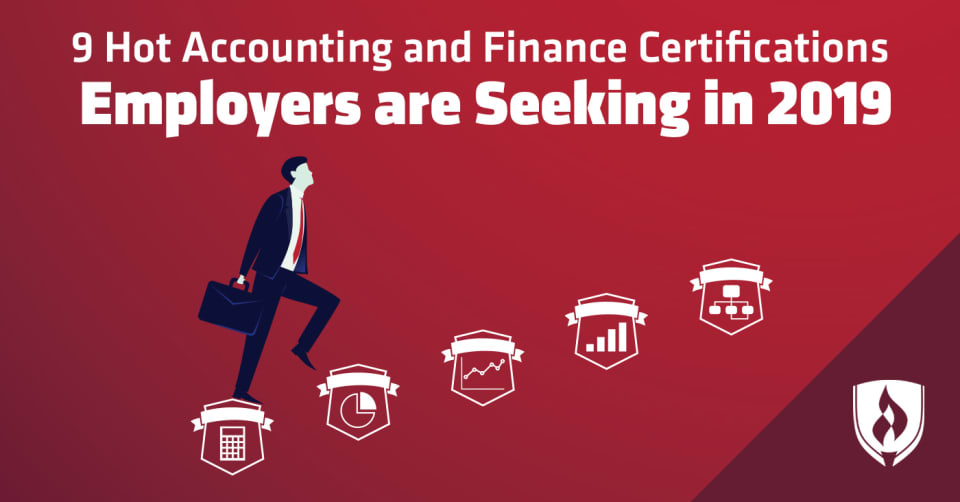9 Hot Accounting and Finance Certifications Employers Are Seeking in 2019
By Ashley Brooks on 12/17/2018

With your head for numbers and your ambitious drive, it’s no surprise you were drawn to fields like accounting and finance. You want to pursue these numbers-focused fields because you know they’d value your natural skills and reward your ambition with advancement opportunities. While a degree in Accounting or Finance is a great start, you may be wondering about potential certifications to pursue down the line in order to help bolster your resume.
That’s no simple task—there are quite a few certifications related to Finance and Accounting to choose from. You want to make sure you’re putting your energy toward earning the designation that best fits your career goals. That’s why we’re giving you the rundown on nine hot accounting and finance certifications that will make your employer take notice.
9 In-demand accounting and finance certifications to boost your career
Having the right skills and qualifications is essential if you want to stand out in competitive industries like accounting and finance. We consulted the 2019 Robert Half Accounting and Finance Salary Guide to discover the most in-demand accounting and finance certifications in 2019, then combined this knowledge with an analysis of more than 400,000 real-time job postings to bring you the most common job titles associated with each certification.*
1. Certified public accountant (CPA)
What is it? CPAs are licensed by their state’s board of accountancy to provide accountancy services to the public. Not all accountants are CPAs, but the credential signifies a high-quality, respected accounting professional.
Certification process: The process of becoming a CPA varies by state, but most require at least a Bachelor’s degree and two years of public accounting experience before you’re eligible to sit for the Uniform CPA Exam. The exam itself is made up of four sections, each of which takes up to four hours to complete.
Most common job titles:
- Senior accountant
- Accounting manager
- Tax manager
2. Chartered financial analyst (CFA)®
What is it? The CFA certification is the highest designation in investment management. CFAs are recognized as hardworking financial pros who are the top in their field, and they often spend their time reviewing the numbers of other accountants and making recommendations to their clients.
Certification process: The Chartered Financial Analyst Institute manages the CFA certification. You’ll need a Bachelor’s degree or four years of professional work experience to be eligible to sit for the exam, which is taken in three levels. After passing the exam, CFA members must have four years of investment decision-making experience before joining as a continuing member of the CFA Institute. Annual dues to maintain certification are $275.
Most common job titles:
- Financial advisor
- Financial analyst
- Portfolio manager
3. Certified financial planner (CFP)®
What is it? CFPs are trusted investment professionals who are well qualified to give sound, ethical financial advice. They are fiduciaries who are required to act in their clients’ best interests as they provide guidance on retirement planning, insurance needs, investment options and more.
Certification process: CFPs must pass the CFP Certification Exam in addition to agreeing to abide by the CFP Board’s code of ethics and rules of conduct. CFPs must also hold a Bachelor’s degree from an accredited program and have six thousand hours of experience.
Most common job titles:
- Financial solutions advisor
- Financial consultant
- Wealth management advisor
4. Chartered global management accountant (CGMA)®
What is it? The CGMA designation was established by the American Institute of Certified Public Accountants (AICPA) and the Chartered Institute of Management Accountants (CIMA) to recognize accountants who are dedicated to becoming business leaders. This global certification is awarded to management accountants who have proven high levels of competence and are committed to staying on top of developments in the industry.
Certification process: Anyone with a Bachelor’s degree is eligible to register for the CGMA Finance Leadership program, a self-paced online competency framework that covers common areas of business leadership at three different levels: operational, management and strategic. Each level takes most candidates 9 to 12 months to complete, including a case study exam.
Most common job titles:
- Senior accountant
- Financial analyst
- Controller
5. Certified internal auditor (CIA)®
What is it? CIA designations are awarded by the Institute of Internal Auditors (IIA). This globally recognized credential signifies a highly trained accounting professional who has the experience and ethical standards to verify the financial records of the company they work for.
Certification process: Internal auditors must have an Associate’s degree or higher, a character reference to demonstrate moral standing and between 12 and 60 months of internal auditing experience (dependent upon education level) to be eligible for certification. Once these requirements have been met, a candidate may register to take the three-part CIA exam.
Most common job titles:
- Internal auditor
- Information technology auditor
- Audit manager
6. Certified information systems auditor (CISA)®
What is it? This globally recognized certification is for leaders of the IT business world. Those who hold a CISA designation have proven that they have the skills and experience to assess IT systems vulnerabilities and maintain high standards of IT security for their organization.
Certification process: The Information Systems Audit and Control Association (ISACA) handles the CISA certification process. The exam itself is open to anyone, and ISACA encourages “Anyone who has an interest in information systems audit” to pursue certification. After passing the exam, the CISA designation is awarded to candidates who complete five years of related work experience.
Most common job titles:
- Information technology auditor
- Security analyst
- Risk manager
7. Certified management accountant (CMA)®
What is it? The CMA certification is for professionals who want to focus on corporate finance and management accounting. Awarded by the Institute of Management Accountants (IMA), the CMA designation is a hallmark of financial business leaders.
Certification process: The CMA exam is taken in two parts and covers 11 competency areas related to financial planning and control and financial decision making. You’ll need a Bachelor’s degree and two years of work experience before taking the exam, which has a 50 percent global pass rate and takes an average of 12 to 18 months to complete.
Most common job titles:
- Controller
- Accounting manager
- Chief financial officer
8. Certified payroll professional (CPP)®
What is it? The American Payroll Association (APA) awards the CPP certification to payroll specialists who are serious about advancing their careers. Earning the CPP designation signifies a deep knowledge of payroll taxes, benefits issues, compliance and more.
Certification process: Payroll professionals are eligible to take the CPP exam if they have worked in payroll for at least three of the last five years. However, those with less work experience have the option of completing certain APA payroll courses and taking the exam sooner. Once certified, CPP-holders must remain in good standing through continuing education hours.
Most common job titles:
- Payroll specialist
- Payroll administrator
- Payroll supervisor
9. Chartered property casualty underwriter (CPCU)®
What is it? A CPCU-holder is an insurance professional whose expertise is in property-casualty insurance. Their certification holds them to high standards of ethics, experience and education and signals to customers that they’re a trustworthy expert in the industry.
Certification process: The CPCU certification is awarded by The American Institute for Chartered Property Casualty Underwriters and requires completing eight specialized courses (each with its own culminating exam), passing an ethics exam and maintaining insurance-related work experience in the years leading up to course completion.
Most common job titles:
- Commercial underwriter
- Account manager
- Claims representative
Which certification will help you reach your goal?
Earning one of these finance or accounting certifications can help you stand out among the crowd. But no matter which route you choose, most careers in these fields begin with a great education. Learn more about the benefits of an Accounting degree or a Finance degree to get started.
*Burning-Glass.com (analysis of 405,049 accounting and finance job postings, Oct. 01, 2017 – Sep. 30, 2018)
Chartered Financial Analyst and CFA are registered trademarks of CFA Institute.
Certified Financial Planner and CFP are registered trademarks of Certified Financial Planner Board of Standards, Inc.
Chartered Global Management Accountant and CGMA are registered trademarks of American Institute of Certified Public Accountants.
Certified Internal Auditor and CIA are registered trademarks of Institute of Internal Auditors, Inc.
Certified Information Security Auditor (CISA) is a registered trademark of ISACA.
Certified Management Accountant (CMA) is a registered trademark of Institute of Certified Management Accountants, Inc.
Certified Payroll Professional is a registered trademark of American Payroll Institute, Inc.
Chartered Property Casualty Underwriter CPCU is a registered trademark of The American Institute for Chartered Property Casualty Underwriters.




